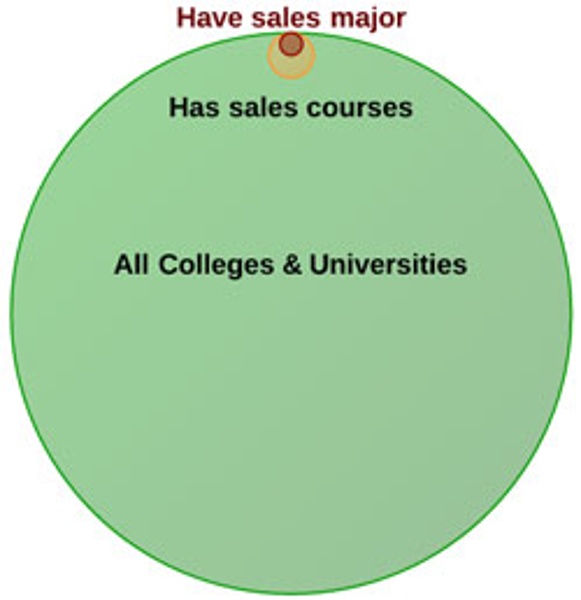
My friend and sales trainer extraordinaire, John Barrows, has a great line:
There are over 4000 Colleges and Universities in the US. You can take Sales courses in fewer than 100. You can major in Sales in just 15.
Wow. There’s an obvious problem here.
Companies need a pipeline of sales candidates; while many Universities are producing graduates who’ve never seen the word ‘sales’ on the curriculum. Full disclosure: my degree in 19thcentury Russian literature left me unprepared for Day 1 at my first sales job.
Moving towards a solution
I recently met David McFarlane with the Entrepreneurship Center at UMass Boston. David has 25+ years in B2B with time as VP, Alliances, COO and most recently co-founder and CEO. He now serves as Director and Entrepreneur in Residence for the EC.

1) Practical sales courses
UMass Boston offers a course on Entrepreneurship Sales and Marketing. David described it as ‘soup-to-nuts’ coursework for B2B. They take sales from the academic to the practical by including role play, live execution, and courses written and delivered by B2B Sales & Marketing practitioners.
2) Live selling experience
This bit is extremely interesting. UMass Boston has built a Market Development Center where students work on calling programs for local B2B technology companies. I think of it as the joining of an internship and pay-for-performance appointment setting. Students are trained on the tools, process & methodology for outbound calling campaigns: targeting new segments, bringing new products to market, account profiling, etc. Companies get immediate pipeline and a pool of future candidates. Not a bad deal!
The big idea here is that a different type of university graduate is possible.
One who is both familiar with key B2B concepts (inbound marketing, using CRM, persona-based messaging, outbound calling, power dialers, pipeline & forecasting) and has experience executing them hands-on.
Now comes your part
If you’re local to Massachusetts, reach out to David to see what the Entrepreneurship Center can do for you. You can contact him here or on LinkedIn.
If you’re outside the Bay State, perhaps your local College or University has a similar program. The Sales Education Foundation put together a ‘top sales schools’ list that should be helpful.
Final thought
There is opportunity here for all of us to participate. If you have the time, and inclination, there’s no reason you can’t guest lecture at your alma mater or a local college. The more B2B executives who spend time in the classroom, the better for the future of our profession.
Take Pete Gracey, President of AG Salesworks. Outside his normal job, he teaches Intro to CRM and Tactical Sales & Marketing at UMass Amherst. Those students are learning from one of the best!
How about you? Are you finding ‘sales program’ graduates? Have you reached out to schools in your area? Please let us know in the comments.




Hi Matt: there’s are reasons for the 4,000:100:15 ratio you described. I question whether there’s a problem or, assuming there is one, how obvious it really is.
Similar to you, sales education is a passion for me, and I have been deeply involved as a sales trainer, writer, faculty adjunct, and as an alumni advisor to my graduate program in IT at the University of Virginia. I have long lobbied UVa to offer focused classes or seminars in selling to undergraduate students. But I have learned that there are good reasons deans resist the idea.
1) Demand. In 2012, Gerhard Gschwandtner of Selling Power magazine predicted that out of 18 million salespeople currently in the US, fewer than 3 million will be needed by 2020. His forecast has been shared by many (including me, in a recent article, Evolution or Extinction? Is the Sales Workforce Future Ready?). Whether you think his projection is accurate matters less than the direction or trajectory of demand for salespeople. It’s hard to get a dean excited about initiating a program in anything when it’s likely there won’t be adequate demand for the major. And right now, there are much sexier opportunities that resonate with students and campus recruiters – data analytics, accounting, and entrepreneurship (which I’ll get back to in a moment) for example.
2) Image. Though it pains me to say it, professional selling has an image problem among millenials. We might as well face up to it. I’ve been closely involved with this on the high school and now, college level. Although my observations are anecdotal, I have learned that students are not clamoring to enter the selling profession, except as a springboard to something better – like entrepreneurship.
3) Faculty. Qualified professors are needed to teach selling, and they aren’t easy to find. Most people who have come up in the sales ranks and who would be best qualified to teach courses in sales don’t hold advanced degrees (another way the sales profession has sort of shot itself in the foot).
4) Alternative programs are readily accessible. There are many training programs for salespeople that, when combined with an undergraduate degree and even limited work experience, are possibly far more effective.
I write these points as an ardent proponent of the value and benefits of higher education for salespeople. I applaud the efforts of the people and institutions you have mentioned in your blog. But I think the most effective way to offer a sales education isn’t to offer major programs in selling, There’s too much overhead, and questionable demand for the students.
Rather, universities and other institutions need to offer single-semester courses and seminars to students in business and entrepreneurship programs. At the University of Virginia, the McIntire School of Commerce has pioneered an innovative and highly-successful program called master of science in commerce. The program is designed for liberal arts majors who want to obtain a business education. I see great opportunities to provide a ‘Sales 101’ style course to help students learn about professional selling. And the icing on the cake – the course would be invaluable to anyone going into business – not just those who aspire to a career in sales.
Two related articles I wrote on this topic are available on CustomerThink: “Do Salespeople Need a College Education?” and “Will the Next Sales Achiever Need an MBA?”